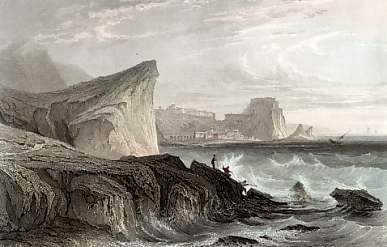
Every day of
his life he failed to negotiate between the Scylla and Charybdis of his
parents. His father beat his mother and his mother beat him. His father was
chaotic and brutal, and left his immigrant wife without remorse. His mother
left the slums and gentrified herself by a sheer effort of will. Her house was
a preserved shell of good taste from fifty years ago. She dieted, seldom
cooked, kept the good china on display, and his childhood bedroom was kept
spotless and oddly pink, decades after he left it.
Nowhere was
the conflict between his parents more difficult than in matters of religion.
His father forbade him to go to church, and his mother made him. So he went,
and after his mother died the best he could say of this woman who could fell
him as he ran with a broom thrown like a javelin, was, with great earnestness,
that she led him to the Christian life.
Church, or
not-church, demonstrated to him that punishment was a given, but he could
choose his punishment. The rest of his life worked pretty much like that. His
many efforts to be useful came across as ingratiating. His attempts at sexual
relationships created vehement disapproval, both for being with other men and
for existing at all. He remained close to his family, even when he couldn’t
live with them, and saw himself as their servant.
It didn’t
help that he had a mild intellectual disability and a stack of anxiety related
behaviours that got him into frequent trouble. He blamed his father for his
angry outbursts. He saw his anger as something that had been implanted in him,
and he could not take any responsibility for it. He lived in a world that
almost made sense, at least it would if people didn’t annoy him and if they understood
his point of view. He managed it all by humming and muttering and nodding and
blinking and wringing his hands, and all these things helped him, even if
people seemed to find them off putting when he went on buses and tried to make
conversation.
The death of
his father threw him into brief fury. For about a month he slept badly, flew
off the handle easily and failed to make amends. But the death of his mother, a
year later, precipitated a deeper response. I’m an orphan, he said. He was, at
58. It would be different if I had a mother, he would say. I wouldn’t be an
orphan.
Much of his
emotional voyaging had taken place in reaction to different types of authority
–to his parents, obviously, and to the rules and ideologies steering the ships
of the various institutions he had always lived in as an adult. So newly
orphaned, he set out to replicate his authority figures as best he could. It
was plain to him that he could not look after himself. He needed parents. So in
his mind his brother became his father and his sister became his mother. He was
explicit about this. He wasn’t unsophisticated about it. He understood it as a
conscious attempt to reconstruct his emotional life. He knew they weren’t
really his parents and could not do the job that parents should. But they were
the best he had. This attempt at conceptual flexibility was costly for him, being
as he was a man whose world view you could usually bend steel around. It could
only be done by necessity, and only if he was willing to leave some almighty
and excoriating gaps in his already troubled inner life. Of course his executive
functioning suffered. So he kept busy, staved off depression, and grieved
honestly and with dignity. Very occasionally, over time, he would remark that
now his parents were gone, he was no longer subject to their influence. He no
longer needed to be dutiful. He could think his own thoughts and make his own
choices.
In reference
to the motif above, in the Odyssey, Scylla is a rock and Charybdis a whirlpool.
Odysseus has to choose how to steer his ship between them. Thus it provides a
metaphor for a decision between two unpalatable options. Odysseus maneouvres
his ship closer to Scylla, the rock. He chooses to lose a few men rather than
the whole ship in the whirlpool Charybdis.
We sometimes
sacrifice a part of ourselves in order to preserve the whole. We often choose
Scylla and it is often the only choice that enables our survival. We might
sacrifice our ability to have passions and fantasies, to be desperate, to be
delighted, to be great, in order to get by day to day, and who can blame us.
The terrible passage between the rock and the whirlpool, so legendary they are
given names, is real and compelling and for many of us it is all we can do.
May this man,
with all his disadvantages, sail out of the passage, not safe, but more human.
May we all sail out, not safe, because safety (at least on its own) impoverishes
our souls, but more human.
